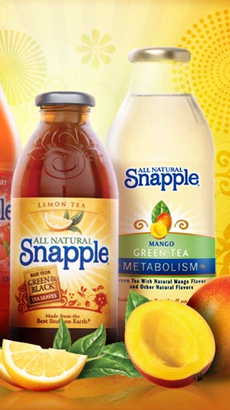NEWS: Bottled Tea Can Be Low On Antioxidants

A good choice: Snapple shows the milligrams |
Bottled tea is a $1 billion industry in the United States. In the past decade, many people have switched to it from soft drinks because of the antioxidant-generated health benefits. (The antioxidants are in black, green and white tea. Red tea—rooibos—and other herbal teas don’t contain them.)
Yet a new study has found that the majority of bottled teas bought at the supermarket contain far lower levels of tea polyphenols (the specific antioxidants) than tea that is brewed at home. In fact, says the study, some bottled tea brands contain such small amounts of polyphenols that one would have to drink 20 bottles to get an amount equal to the polyphenols found in one cup of home-brewed tea. (Learn more about polyphenols in our Antioxidant Glossary.) The statement was released on Sunday at the national meeting of the American Chemical Society. The study was conducted by researchers Shiming Li and Chi-Tang Ho of WellGen, Inc., a biotechnology company in North Brunswick, New Jersey. The brands were not identified in the statement, but publication of the full study is anticipated. The six teas analyzed contained 81, 43, 40, 13, 4, and 3 milligrams of polyphenols per 16-ounce bottle. One average cup of home-brewed green or black tea contains 50-150 milligrams of polyphenols. The teas below that threshhold contain amounts so small, the researchers say, that they likely offer little or no health benefits. |
|
| Senior scientist Li stated that “there is a huge gap between the perception that tea consumption is healthy and the actual amount of the healthful nutrients—polyphenols—found in bottled tea beverages. Our analysis of tea beverages found that the polyphenol content is extremely low.”
Li added that consumers buying commercially bottled teas may actually be spending money on substances detrimental to health, including sugar and high fructose corn syrup. Will this lead to consumer demand that the polyphenols be printed on the nutrition labels? We hope so! Snapple justifies its claim, “Made from the best stuff on earth,” by displaying the polyphenol count on each bottle. Most of its teas have more than 50 mg per serving, and quite a few have 71 mg—nicely into the range of home-brewed tea. After water, tea is the world’s most highly-consumed beverage.
|
||

